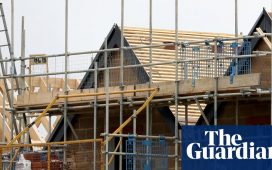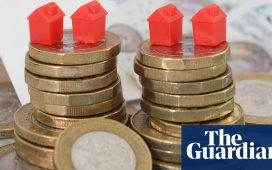One of China’s top financial officials has sought to rebuild confidence in the struggling property sector on the eve of the country’s annual rubber-stamp congress, as Beijing looks to revive a central driver of economic growth.
Pan Gongsheng, vice-governor of the People’s Bank of China, said the central bank would “learn from experience”, a reference to the market liquidity crisis triggered by the default of property developer Evergrande in late 2021 and the government’s introduction of tighter debt limits.
“The financing environment in the real estate industry, especially among high-quality developers, has improved significantly,” Pan said at a press conference in Beijing on Friday, pointing to a rise in bond issuance and loans for mergers and acquisitions late last year after Beijing unveiled measures to boost lending to real estate developers.
The ailing property sector — with developers starved of credit and housing projects left unfinished — is one of the biggest challenges facing Chinese policymakers as they try to revive an economy weakened by three years of Covid restrictions. China’s gross domestic product added just 3 per cent last year, far below a target of 5.5 per cent.
The end of zero-Covid restrictions in December has fuelled hopes of a rebound. Analysts expect officials to unveil a growth target of more than 5 per cent at the National People’s Congress, the annual meeting of China’s political leadership, which opens in Beijing this weekend. An official survey released this week showed manufacturing activity increased by its fastest monthly rate in a decade.
But the performance of the real estate market, which makes up more than a quarter of economic activity, will be critical to achieving robust growth.
Ning Zhang, an economist at UBS, suggested that any reference at the NPC to “fundamental support for upgrading demand for housing” could signify further softening towards the sector, and added that financing conditions for top developers had been “improving notably”.
The Swiss bank expects further easing to come in the form of lower mortgage rates, reduced downpayments, relaxation of home purchase restrictions and more credit support from banks to restart stalled projects.
The central bank and other financial regulators in November rolled out an array of 16 supportive measures for developers that included relending programmes for unfinished homes and credit support. Chinese state banks that month also unveiled about $256bn in credit lines to select developers.
Pan said that the measures had “promoted the smooth operation of the real estate market”. He also made unusually direct comments about Evergrande, which has yet to restructure almost $300bn of liabilities.
“Its balance sheet was high risk and it bore unsustainable risks,” he said, comparing the developer’s collapse to a patient who has a stroke after suffering from hypertension.
Activity in the property sector remained weak in the first two months of 2023. Sales in major cities fell 14 per cent year on year, according to Financial Times calculations based on high frequency data, though that figure was its slowest rate of decline since June last year, and down from a 21 per cent fall in December.
“At this moment the housing sector is improving on the margins, but the construction side is still very, very weak . . . it’s probably still going to remain pretty weak this year,” said Larry Hu, chief China economist at Macquarie.
Hu noted that new bank loans hit Rmb5tn ($725bn) in January, the highest level on record, but that the lending was primarily directed to the state sector. New long-term household loans, which are mainly mortgages, totalled just Rmb223bn, nearly a third of last year’s level.











